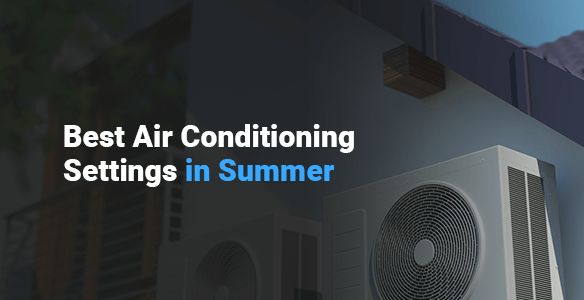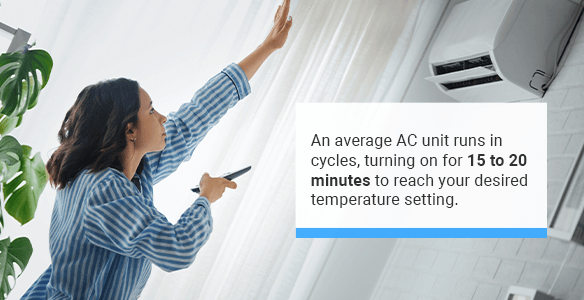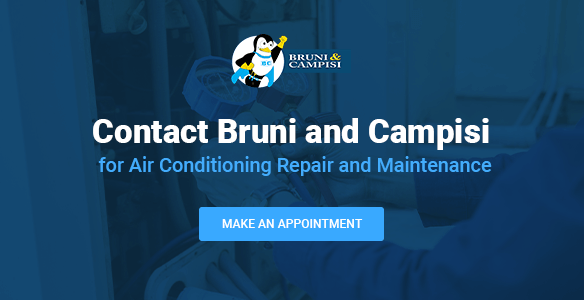Best Air Conditioner Setting For Summer
With record-setting temperatures reaching the triple digits across the Northeast coastline, New York and Connecticut residents depend on reliable air conditioning to escape the extreme heat.
Learn how to choose the best AC setting in summer to keep you cool all season long. Discover tips to help you run your air conditioner efficiently, remove unexpected in-home heat sources and make it through the heat waves with a well-maintained, adequately set AC unit.
If you’ve ever played “AC settings tag” with your family, you understand that people can have very different ideas about the best temperature setting for AC in summer. Educate your household and determine your home’s ideal AC settings based on the following preferences:
- Energy conservation: Energy Star recommends setting the thermostat to 78 degrees Fahrenheit during warm months to save energy and lower the electric bill.
- Money savings: The U.S. Department of Energy (DOE) encourages setting the AC temperature at 85 degrees for eight hours per day when you leave the house to save 5-15% on your cooling bills.
- A good night’s sleep: If you can comfortably sleep in a warm room, Energy Star suggests an overnight AC setting of 82 degrees, but that may be too warm for most sleepers. Studies show that the optimal sleep temperature is much lower — approximately 65 degrees — because our bodies are programmed to experience a core temperature dip at night. In the Northeast, you can sleep well and save costs by using bedroom fans and opening your windows whenever it’s cooler overnight.
Concerned you may forget to manually change these settings every morning, afternoon and night? Don’t sweat it! Use a programmable thermostat to adjust settings automatically throughout the day.
What Is the Best AC Setting During a Heat Wave?
It may not be hot enough to fry an egg on the sidewalk this summer, but it certainly feels like it. In recent years, the heat wave season has risen to a whopping 47 days longer than it was fifty years ago, and June 2021 was America’s hottest June ever in 127 years of records.
Even if you have the world’s greatest air conditioner, you can expect your unit to cool your home about 20 degrees lower than the outside temperature during a heat wave. Follow DOE temperature settings and implement the following tips.
7 Tips to Cool Your Home During Hot Days and Heat Waves
Stay hydrated and indoors during a heat wave. Here’s how you can lower your home’s interior temperature and preserve your AC unit:
- Switch the fan position from “auto” to “on”: To help with temperature differences between levels and rooms, turn the fan setting to “on” to circulate the air consistently 24/7.
- Set the thermostat to a higher temperature: It may seem counterintuitive, but it’s a good idea to set your thermostat to 75 degrees or higher to prevent overworking your AC unit on sweltering days.
- Only cool the used rooms: Close air vents in unused rooms and keep those doors shut to conserve energy.
- Block the sun: Close every shade and draw your curtains in every room.
- Avoid appliance use: When it’s already roasting, the last thing you want to do is add more heat. Avoid using the oven, washer and dryer until the weather cools.
- Use ceiling fans: While fans technically cannot reduce the air temperature in a room, they circulate the air and dry perspiration on your skin, making you feel cooler.
- Maintain your AC unit: Ensure your air conditioning can work at full potential with regular maintenance and cleaning.
Is It OK to Run AC All Day?
An average AC unit runs in cycles, turning on for 15 to 20 minutes to reach your desired temperature setting, turning off to rest until the house temperature reaches your setting again, repeating the process every day. When temperatures consistently surpass degrees in the high 80s or 90s, your air conditioning may run more than usual or never turn off. In some cases, running constant AC is fine, and a number of energy-efficient systems are designed to run 24/7.
For other units, running all day long isn’t ideal because:
- It overworks the unit.
- It increases cooling costs.
- It may indicate a deeper problem.
Why Is the House so Hot Even With the AC On?
Does your house seem unusually hot even with your air conditioner on? Even with your AC blowing cool air, your rooms may feel warm due to the sun, poor air circulation, maintenance and other factors that have nothing to do with your unit.
10 Reasons Why Your AC May Be Working at Limited Potential
Check your air conditioner settings for summer and follow these home preparation tips to maximize your unit’s ability to create a cooler interior environment.
- Incorrect thermostat settings: Inefficient temperature settings can overwork your unit. Adjust your settings to Energy Star and DOE recommendations for maximum energy efficiency.
- Clogged air filter: A dirty air filter disrupts airflow and forces your unit to work harder. Replace filters every 90 days or more frequently at 30-60 days if you have allergies or pets.
- Incorrect unit size: An older or undersized unit may cool the air but won’t reduce humidity properly.
- Corroded coils: Salt in the air can impact AC units, so homeowners near the shore should check their coils frequently. If you notice powdery white or flaking coils, your unit may require maintenance.
- Dirty or damaged ductwork: Leaky ductwork allows cool air to escape before it reaches all rooms of the house. If your ductwork is too small or grimy, it won’t adequately handle the airflow. Check for damage and dirt — your ductwork may need cleaning or patching.
- Refrigerant leak: A slow refrigerant leak may escape your notice without proper inspection. Minor leaks are a common AC issue that may require a filter replacement or additional maintenance to correct.
- Blocked condensing unit: Check your outdoor AC condenser to make sure it’s clear on all sides. Remove any landscaping overgrowth so it can exhaust heat safely.
- Competing heat sources: Remove extra heat from the equation to prevent an overworked unit. Block sunlight, close doors to unused rooms and avoid appliance use.
- Poor insulation: Improper home insulation around doors and windows allows hot, humid air to seep into your home. Draft-proof your home with weatherstripping, insulated curtains, new door sweeps or door snakes.
- Lack of air circulation: Improper air ventilation and circulation in the home can affect air distribution. Check your vents and turn on fans to improve airflow.
If you’re still sweltering even after implementing recommended adjustments — or if your AC unit shows signs of damage and continued inefficiency — then it’s time to schedule professional maintenance.
Contact Bruni and Campisi for Air Conditioning Repair and Maintenance
For air conditioning repairs, maintenance and upgrades to beat the heat this summer, look no further than Bruni and Campisi. For more than 40 years, our full-service, NYSERDA Home Energy Performance–participating HVAC contractors have been helping homeowners in New York and Connecticut increase energy efficiency, lower utility bills and keep their units running smoothly. Quick and efficient, we provide the expertise, quality and customer-first professionalism you and your home deserve. And with our one-year labor warranty on all work performed, you have peace of mind that your investment is protected.
Don’t hesitate to contact us to schedule your air conditioning service, upgrade or whole home maintenance plan today. We look forward to working with you.



